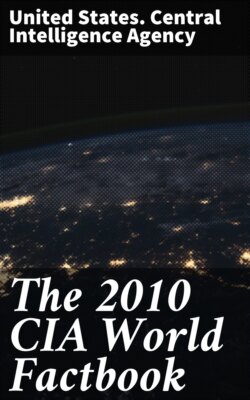Читать книгу The 2010 CIA World Factbook - United States. Central Intelligence Agency - Страница 75
На сайте Литреса книга снята с продажи.
ОглавлениеMilitary ::Albania
Military branches:
Joint Force Command (includes Land, Naval, and Aviation Brigade
Commands), Joint Support Command (includes Logistic Command),
Training and Doctrine Command (2010)
Military service age and obligation:
19 years of age (2004)
Manpower available for military service:
males age 16–49: 947,446
females age 16–49: 910,145 (2010 est.)
Manpower fit for military service:
males age 16–49: 802,097
females age 16–49: 768,953 (2010 est.)
Manpower reaching militarily significant age annually:
male: 35,249
female: 31,855 (2010 est.)
Military expenditures:
1.49% of GDP (2005 est.) country comparison to the world: 103
Transnational Issues ::Albania
Disputes - international:
the Albanian Government calls for the protection of the rights of ethnic Albanians in neighboring countries, and the peaceful resolution of interethnic disputes; some ethnic Albanian groups in neighboring countries advocate for a "greater Albania," but the idea has little appeal among Albanian nationals; the mass emigration of unemployed Albanians remains a problem for developed countries, chiefly Greece and Italy
Illicit drugs:
increasingly active transshipment point for Southwest Asian opiates, hashish, and cannabis transiting the Balkan route and - to a lesser extent - cocaine from South America destined for Western Europe; limited opium and expanding cannabis production; ethnic Albanian narcotrafficking organizations active and expanding in Europe; vulnerable to money laundering associated with regional trafficking in narcotics, arms, contraband, and illegal aliens
page last updated on January 20, 2011
======================================================================
@Algeria (Africa)
Introduction ::Algeria
Background:
After more than a century of rule by France, Algerians fought through much of the 1950s to achieve independence in 1962. Algeria's primary political party, the National Liberation Front (FLN), was established in 1954 as part of the struggle for independence and has largely dominated politics since. The Government of Algeria in 1988 instituted a multi-party system in response to public unrest, but the surprising first round success of the Islamic Salvation Front (FIS) in the December 1991 balloting spurred the Algerian army to intervene and postpone the second round of elections to prevent what the secular elite feared would be an extremist-led government from assuming power. The army began a crackdown on the FIS that spurred FIS supporters to begin attacking government targets, and fighting escalated into an insurgency, which saw intense violence between 1992–98 resulting in over 100,000 deaths - many attributed to indiscriminate massacres of villagers by extremists. The government gained the upper hand by the late-1990s, and FIS's armed wing, the Islamic Salvation Army, disbanded in January 2000. Abdelaziz BOUTEFLIKA, with the backing of the military, won the presidency in 1999 in an election widely viewed as fraudulent, was reelected to a second term in 2004, and overwhelmingly won a third term in 2009 after the government amended the constitution in 2008 to remove presidential term limits. Longstanding problems continue to face BOUTEFLIKA, including large-scale unemployment, a shortage of housing, unreliable electrical and water supplies, government inefficiencies and corruption, and the continuing activities of extremist militants. The Salafist Group for Preaching and Combat (GSPC) in 2006 merged with al-Qai'da to form al-Qai'da in the Lands of the Islamic Maghreb, which has launched an ongoing series of kidnappings and bombings targeting the Algerian Government and Western interests.
Geography ::Algeria
Location:
Northern Africa, bordering the Mediterranean Sea, between Morocco and Tunisia
Geographic coordinates:
